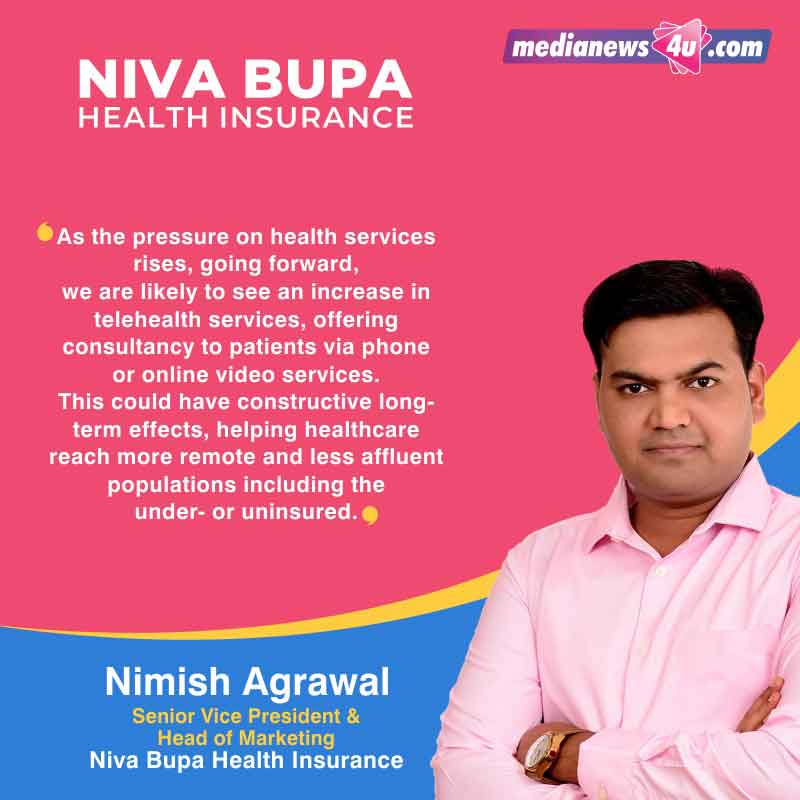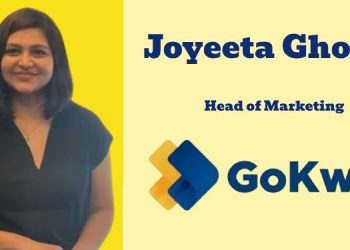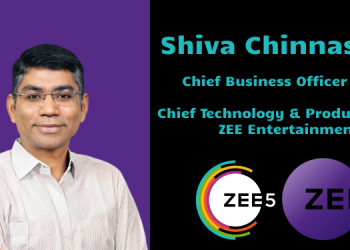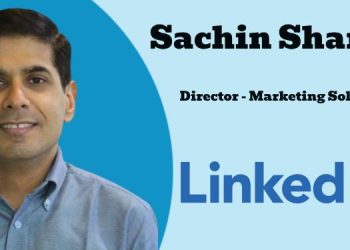NivaBupa, a leading standalone health insurance player in India, is a joint venture between Fettle Tone LLP (an affiliate of True North Fund VI LLP), a leading Indian private equity firm, and the Bupa Group, a leading international healthcare company with a legacy of providing specialized healthcare services for over 70 years.
In an exclusive chat with MediaNews4U Nimish Agrawal, Senior Vice President & Head of Marketing, Niva Bupa Health Insurance talks to us about the revamp, the growth of insurance during this crisis, and much more…
The strategy behind the revamp of the brand Max Bupa to Niva Bupa?
Rebranding was inevitable as part of the change in shareholders with the exit of Max India in Dec 2019. While coming up with a new brand name we observed that health insurance is no longer looked upon as a financial instrument solely for tax saving purposes. It has evolved into being a self-investment product that takes care of a person’s healthcare needs. This warranted a change in our positioning as well.
The rebranding was done after rigorous consumer testing and insights. The decision of the new brand name was based on a survey and in-depth interviews across new-age millennials and middle-aged customers who were either existing or first-time buyers of health insurance products. With Niva Bupa we will leverage our decade-old understanding of the Indian market and customers’ varied healthcare needs. We want to build an intimate brand that simplifies the health insurance category for ease of understanding amongst the audience.
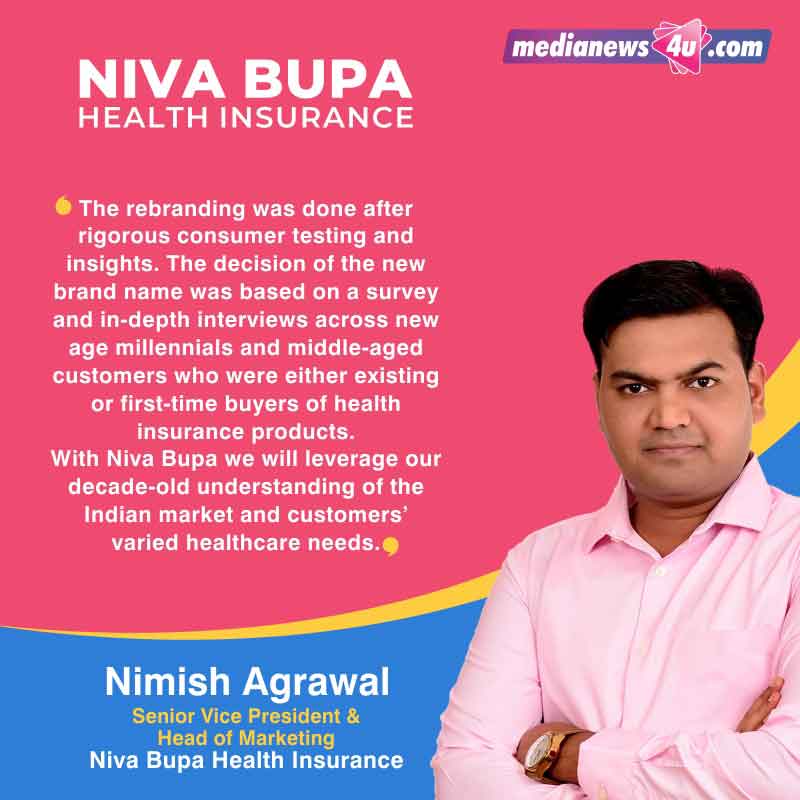
What does Niva mean and what is the USP of the brand?
The term “Niva” is a popular Hindi/ Sanskrit word that also means ‘Sun’ – the source of energy, power, positivity, and above all life in itself. The brand has redefined its purpose “To give every Indian, the confidence to access the best health care”.
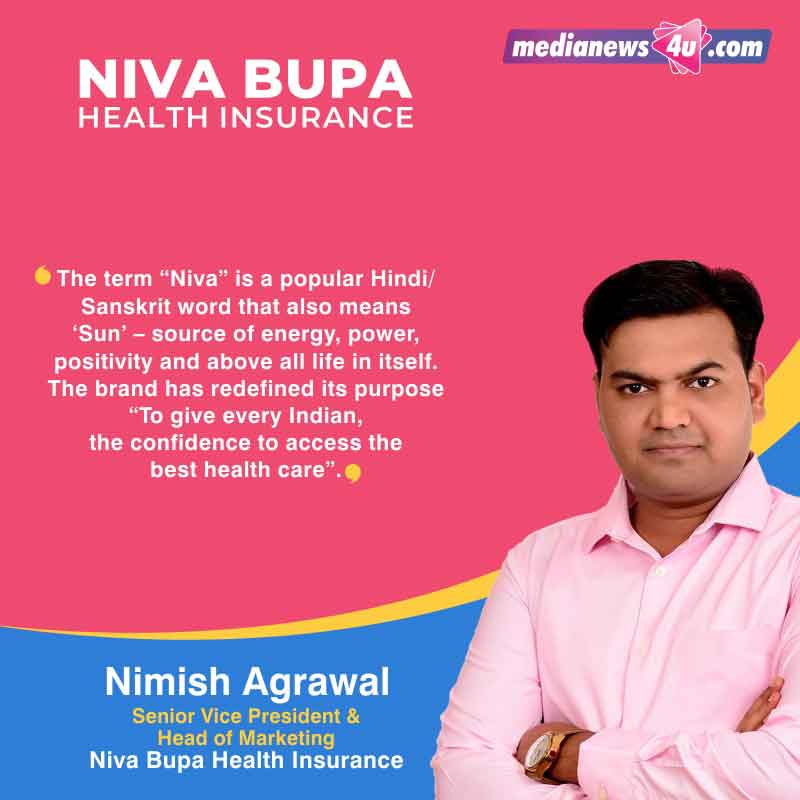
NivaBupa will democratize the health insurance category by bringing more thrust on customer touchpoints and introduce a host of innovative products and digitally-enabled services. We aim to provide financial assurance as well as healthcare access to our customers by taking forward our legacy of product innovation, customer-centricity, and digital capability.
In this pandemic are you seeing a surge in people subscribing to Health Insurance? Are people being more aware of their and their family’s health and wellness in these tiring times?
The pandemic for sure has contributed immensely to raising awareness about the need for health insurance. For the first time in many years, we are also seeing that demand is converting into the purchase. Due to Covid, people are now more concerned about their health and the impact that the cost of medical expenses have on people’s savings. People have realized that it is important to have health insurance for unforeseen health-related situations like we are in today.
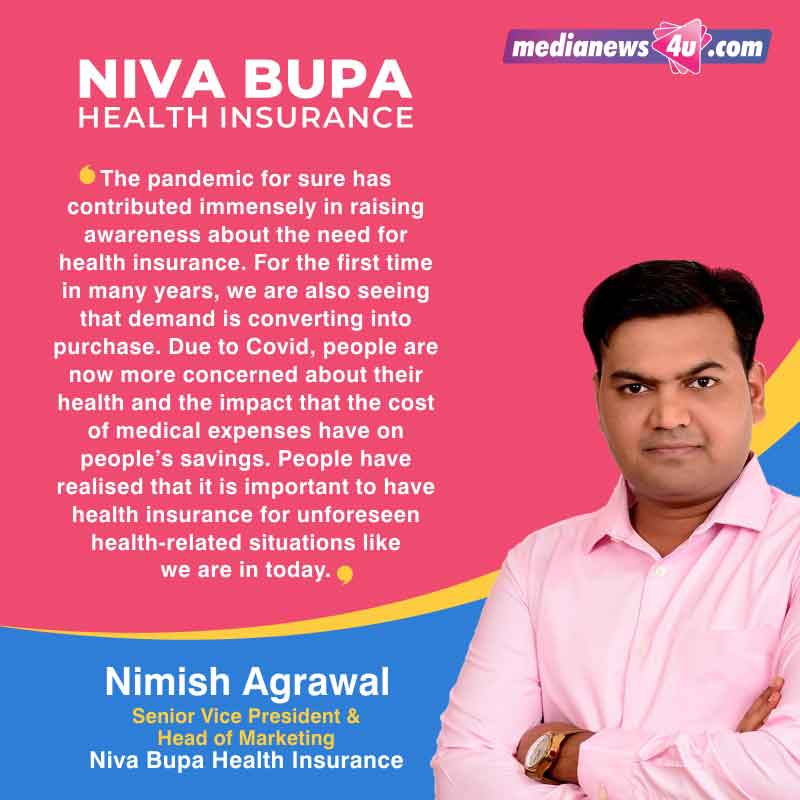
In fact, a Covid-19 survey we conducted last year revealed that before the Covid-19 outbreak in India, only 10% of people were interested in buying health insurance to cover new age diseases. That percentage has jumped significantly post Covid outbreak and now 71% of people consider health insurance as a necessity. The study revealed that 73% of the respondents were willing to pay more premiums to get coverage for Covid-19.
What are some of the insights you would like to share when it comes to health insurance?
Covid has created exponential awareness among consumers regarding the importance of health insurance. Today, customers have started seeing health insurance as a tool that will protect them against any uncertainty rather than just as a tax-saving tool. During the last year, we have seen a drastic shift in the industry in terms of how insurers, as well as consumers, responded to the pandemic. Some of the trends that have emerged lately are:
Awareness converting into purchase: In the past, inquiry to sale would entail two three conversations and the product was a discretionary spend, but today we are seeing one conversation is enough for people to decide. The overall industry has seen exponential growth. As far as Niva Bupa is concerned, we grew at 41% overall last year, and this year in Q1 our growth has been in excess of 90%.
Millennials and women are interested in buying health insurance: With the advent of Covid-19, we have witnessed women and millennials taking an active part in decisions related to health insurance. These people were initially less involved in such decisions. In fact, the Covid-19 survey conducted by us revealed that millennials in the age group of 27-35 emerged as an important segment who were curious to understand health coverage for Covid-19. Around 63% of this age group made inquiries for health insurance and 59% enquired at an early stage when the coronavirus case was first detected in India. Moreover, around 62% of females enquired about the coverage of Covid-19 in health plans, as against 54% males. It was found that 28% of women as against 21% men made an inquiry about health insurance at an early stage when coronavirus case was first detected in India.
High sum insured: Policies with high sum insured have gained more traction during the last year. While people are aware that medical inflation is making hospital treatment costlier, Covid-19 has made that very visible and apparent. The average treatment cost for Covid-19 ranges from around 1.3 lakhs – 1.4 lakhs and this highly infectious disease can affect multiple family members at the same time. Under such a situation, people may find the small sum insured inadequately. In some cases of Covid-19, patients have received bills upwards of INR 20 lakh for a single hospitalization. As a result, people have started investing in health insurance with high sum insured policies.
Digital Buying: Consumers are now more comfortable transacting online. The pandemic has prompted many customers to move to digital channels for their service needs. At NivaBupa, we have invested hugely to build our digital expertise across the entire value chain. We are also enhancing our digital self-serve capabilities and trying to auto-adjudicate claims digitally so that the decision is given in real-time.
The name has changed. What would be the marketing strategies now? Digital is seeing a huge surge. Will the marketing strategy be more inclined toward digital?
Yes, the marketing strategy will be inclined more towards digital going forward. During the last few years, we have invested heavily on building our digital expertise across the entire value chain. Today the complete customer journey right from onboarding to settling claims has become digital. We have digitized our underwriting and risk assessment processes. We are also working towards enhancing our digital self-serve capabilities. Currently, about 60% of the transactions are self-served. This year about 80% of our renewals happened digitally. As far as payments are concerned, about 80-85% of them are done digitally. This year, we are trying to auto-adjudicate claims digitally so that the decision is given in real-time. We have also enhanced our Health App. Today, a customer can book a teleconsultation and order medicines, apart from just buying health insurance.
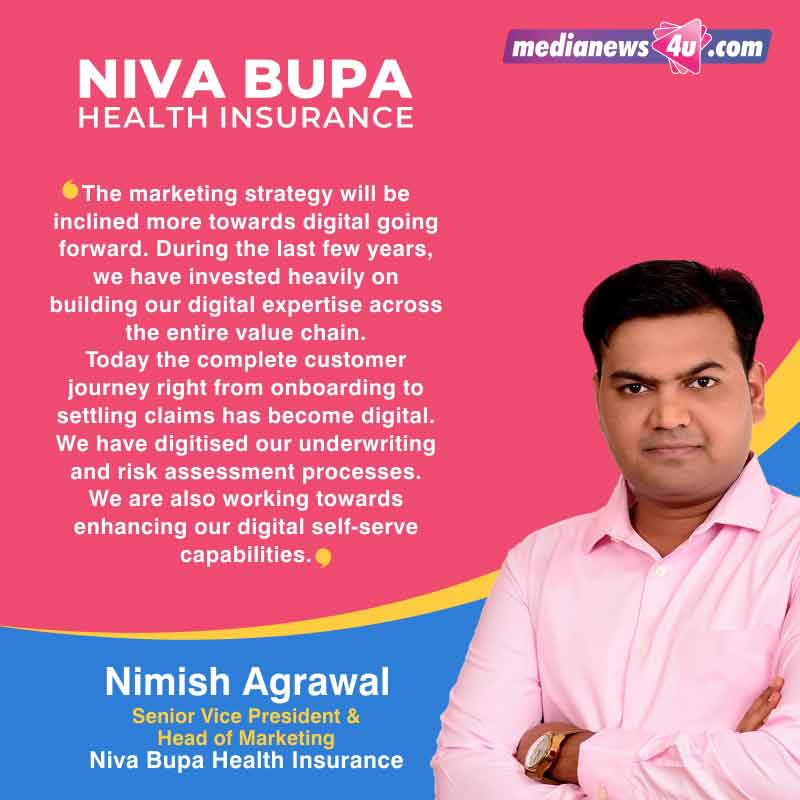
Apart from the above, we have also enhanced our website by leveraging AI such as chatbots which are well equipped to answer most of the queries related to health insurance and Covid-19. We also launched the InstaInsure Pro app that allows the agents to come on board and get all policy details on new and existing customers. This helps the agents to assist customers in an efficient manner.
Way forward in the new normal?
Covid-19 has acted as a catalyst for awareness amongst people regarding the importance of health insurance. As a result, the awareness has grown manifold, which is gradually converting into the purchase. We expect this trend to sustain in the coming years as well, not just in metros but emerging Tier II and III markets as well. People will prioritize health in days to come.
Our recent sales trends show that people are opting for comprehensive health covers that can guard them against Covid-19 and insure them against a host of other unforeseen illnesses. As per an internal survey, 57% of people cited the need for comprehensive covers to be adequately prepared against unforeseen medical emergencies.
As the pressure on health services rises, going forward, we are likely to see an increase in telehealth services, offering consultancy to patients via phone or online video services. This could have constructive long-term effects, helping healthcare reach more remote and less affluent populations including the under-or uninsured. We are also seeing that customers are now more comfortable transacting online. In the future, we should see a disproportionate growth in both assisted and unassisted buying on company-owned websites and through aggregators.
